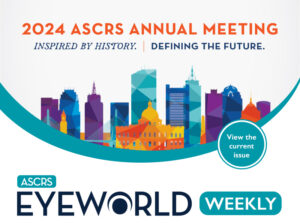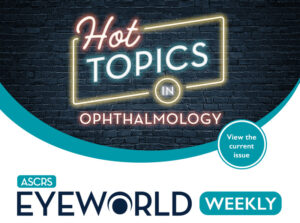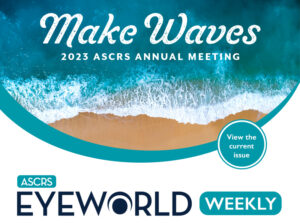
- Full results from Phase 3 study for presbyopia-correcting eye drop
- Cells from two donors treat dozens of patients with corneal endothelial disease
- Study: Dry eye treatment reduces halos after cataract surgery
- NDA accepted for IND application for novel, investigational dry eye drug
- Acquisition of ophthalmic drug candidate
- ASCRS events
July 30, 2021 • Volume 27, Number 30
Full results from Phase 3 study for presbyopia-correcting eye drop
Allergan announced the full results from its Phase 3 GEMINI 1 clinical study evaluating its AGN-190584 (pilocarpine 1.25%) eye drop for the treatment of presbyopia. According to the company’s press release, the study included 323 patients randomized to receive vehicle or AGN-190584. The investigational drug met its primary and secondary endpoints in the study, showing near and intermediate visual gain, no loss of distance vision, rapid onset of action, and sustained vision gain for up to 6 hours, in addition to safety and tolerability. These Phase 3 findings in combination with the company’s GEMINI 2 study formed the basis of Allergan’s already submitted NDA; an FDA decision is expected by the end of the year.
Cells from two donors treat dozens of patients with corneal endothelial disease
Aurion Biotech announced preliminary findings from its IOTA trial, which involved a new cell therapy procedure for patients with corneal endothelial disease. According to the company’s press release, the cell therapy was developed by Shigeru Kinoshita, MD, PhD, and colleagues at Kyoto Prefecture University of Medicine in Japan. It involves culturing cells from a donor in a novel, proprietary process, with the potential for multiple patients to be the beneficiaries (more than 100 according to Aurion’s press release). The company reported the IOTA trial involved 50 patients with corneal endothelial disease who received injection of these cultured donor cells. The treatment reduced corneal edema and restored vision, with safety and tolerability demonstrated.
Study: Dry eye treatment reduces halos after cataract surgery
A company-sponsored study showed the positive effect of LipiFlow (Johnson & Johnson Vision) on quality of vision and MGD. According to the company’s press release 115 patients were randomized to receive LipiFlow ahead of cataract surgery or not. Those in the treatment group showed significantly reduced reports of halo (58.6% in the treatment group compared to 79% in the control group) as well as an improvement in MGD scores.
NDA accepted for IND application for novel, investigational dry eye drug
Allegro Ophthalmics announced that the FDA accepted its NDA for an IND for its investigational dry eye disease drug, which is based on the concept of novel oxidative stress stabilizers. ALG-1007 (fixed combination of 0.6% risuteganib and 0.125% sodium hyaluronate), which will move on to Phase 2b clinical studies, completed prospective, randomized, double-masked, controlled research outside the U.S. where patients with established dry eye disease were assigned to one of four study arms (vehicle and 0.125% sodium hyaluronate, vehicle and 0.6% risuteganib, ALG-1007, and vehicle alone). Patients took 1 drop BID for 12 weeks. ALG-1007 demonstrated the highest efficacy, compared to the other study arms, and no adverse events were reported.
Acquisition of ophthalmic drug candidate
Harrow Health announced that it entered into an agreement with Sintetica to acquire its AMP-100 drug candidate, an ocular surface anesthesia for ocular surgery like cataract surgery and intravitreal injections. AMP-100 recently completed a Phase 3 study, showing positive efficacy and tolerability of the drug compared to standard of care. According to the company’s press release, Harrow Health plans on submitting an NDA to the FDA later this year.
ASCRS events
- 2021 ASCRS Annual Meeting: The ASCRS Annual Meeting successfully concluded in Las Vegas, Nevada, on Tuesday, July 27. Online and on-demand content from the meeting is available for registered physician attendees.
- 2022 ASCRS Annual Meeting hotels: Discounted hotels for the 2022 ASCRS Annual Meeting in Washington, D.C., are now available for booking. Reserve your preferred hotel today.
Research highlights
- A prospective, single-center, three-arm randomized trial evaluated different extents and locations of Schlemm’s canal incisions during suture trabeculotomy. Ninety-nine eyes were assigned to 360-degree incisions, upper 180-degree incisions, or lower 180-degree incisions. The mean IOP in all eyes was reduced from 18.6 mm Hg at baseline on 3.1 medications to 13.7 mm Hg with 1.4 medications at 12 months post-trabeculotomy. According to the research, each group produced comparable mean IOPs and similar numbers of medications. The study authors reported significantly more postop hyphema with niveau formation in the 360-degree group compared to the 180-degree group. The research was published in the British Journal of Ophthalmology.
- A prospective study of 90 patients with bilateral high myopia evaluated the effect of cataract surgery on vision-related quality of life. Ninety patients with high myopia were compared to 90 age-matched controls. The BCVA was significantly improved after cataract surgery in the high myopia group with 86.7% achieving ≥0.2 logMAR units of improvement (61.1% in the control group achieved this). The preoperative vision quality of life questionnaire composite score was lower in the high myopia group compared to the control. Postoperatively, the composite score was not statistically different between the two groups, however, the study authors noted that changes in composite score and the scores of seven subscales were greater in the high myopia group. Overall, the authors concluded that vision-related quality of life is significantly impaired in patients with cataract and high myopia. It is “remarkably improved by cataract surgery,” the authors stated. The research is published in the journal Eye.
Product news
- Johnson & Johnson Vision’s VERITAS Vision System is now commercially available.
This issue of EyeWorld Weekly was edited by Stacy Jablonski and Liz Hillman.
EyeWorld Weekly (ISSN 1089-0319), a digital publication of the American Society of Cataract and Refractive Surgery (ASCRS), is published every Friday, distributed by email, and posted live on Friday.
Medical Editors: Eric Donnenfeld, MD, Chief Medical Editor; Rosa Braga-Mele, MD, Cataract Editor; Clara Chan, MD, Cornea Editor; Nathan Radcliffe, MD, Glaucoma Editor; and Vance Thompson, MD, Refractive Editor
For sponsorship opportunities or membership information, contact: ASCRS • 12587 Fair Lakes Circle • Suite 348 • Fairfax, VA 22033 • Phone: 703-591-2220 • Fax: 703-591-0614 • Email: ascrs@ascrs.org
Mention of products or services in EyeWorld Weekly does not constitute an endorsement by ASCRS.
Click here to view our Legal Notice.
Copyright 2021, EyeWorld News Service, a division of ASCRSMedia. All rights reserved.



